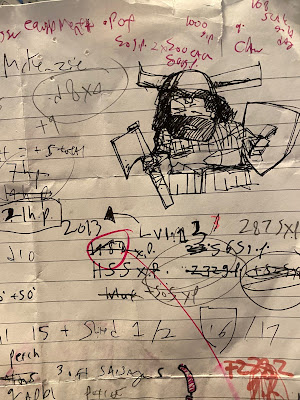 |
| GO! PLAy! GO! NOW! HURRY! |
After two decades of RPG theory, I have boiled down the principles of Old School Renaissance RPG theory down to a single principle.
--
(Oh wait before that, important announcement on the legal front:
That's the third case down if anyone's keeping track. Details here, anyway...)
--
This principle explains why we keep playing D&D despite the creator and copyright holders tremendous flaws.
It explains why we keep playing old versions, with less detail in the characters.
It explains why we tend to disdain too much backstory or involved character creation.
It explains why we so often hack an existing game instead of playing custom-built games from scratch.
It explains why we favor compact, easily-portable and modular blog-sized bits of content that can fit lots of versions of D&D.
It explains why we don't do Session Zeroes much.
It explains why safety tools, while not incompatible with OSR play, aren't really a big thing in OSR.
It explains why "on-boarding" of all kinds--where the DM carefully explains to the players what the premise and expectations of the campaign will be, are--is disdained.
It explains why the GM is given as much power as the group will let them have.
It explains why we the OSR is so improv-friendly and the modules often ask for improv.
It explains why rulings (on the spot) are privileged over rules (new books, to be read).
It explains why 3d6-in-order, character-dies-roll-again is so common.
It explains why dungeons are so common.
It also explains why certain post-80s improvements to games have been picked up by the OSR--including expressing to-hit as a bonus instead of a chart value and improvements in layout and adventure packaging.
It's this:
I wanna play.
That's it: I wanna play now. I want to play an RPG right away!
I am busy I am an adult. I do not have time for anything!
 |
| ROLL ALL THE DICE AT ONCE! HURRY! GO!!! |
OSR PRINCIPLE NUMBER ONE
Any improvement to an RPG experience which extends the time between all the players figuring out when they can all meet to play and when they will actually start playing is unlikely to become standard across Old School play, no matter how great the other advantages of said improvement.
OSR is born of desperate, time-poor circumstances. We play 2 hour sessions before everyone goes to work or school, we play in hotel lobbies, drunk, because 3 people were all like....Hey! We should Play!!!, we play in a box, we play with a fox, we play. We need to play asap!!!!!!
----
An example:
Several months ago I talked about the possibility of my suicide on this blog. This was occasion for great consternation on the part of the good-hearted people in the RPG-o-sphere.
I had a long zoom conversation with Jeff Gameblog and James Edward Raggi about the various problems in my life created by people who had been inspired to make game stuff by myself, Jeff Gameblog and James Edward Raggi. They had initiated contact because they were concerned, but they had no idea what to do.
Jeff said "Well...we should play a game."
I almost said "Go fuck yourself." Like: given fake felony accusations destroying my life your plan is we play a game? Jeff my dude.
But I decided to play.
What did we play?
We played D&D. Not even LotFP.
What characters did we use? Whichever ones we could dig up fastest from games we already played.
What edition were we using? We still don't know.
What spell list are we using? Couldn't say.
Are we using LotFP or Holmes or AD&D or Moldvay versions of spells? Figure that shit out as we go!!
Why? Why not any of the other games or variants on games we have all had so much fun discussing over the decade-plus? Because we wanted to play NOW. Jeff runs his game in a tight 2-hour slot between waking up and getting his kids to work. There is not time for fripperies like playing a game we don't already know already.
No reading no figuring no planning. Get a character, get a dungeon, get a guy, get a girl, get a they, get a whatever, get in there and playyyy.
As the game expanded, we got new players.Who did out first recruit play? A henchman that was already there. Who did they play when that character died? An ogre that was already in the dungeon. What were there stats? We figured it out as we went.
Does this mean each rule we use is possibly not the most optimal one? Yes!
Does this mean the lore is an utter patched-together trainwreck devoid of subtlety? YES!
Is this reliance on the One Game totally fair to other games--including ones we ourselves wrote? NO!
Does this means over a dozen years of pondering all of us have done about clever hacks of the building blocks of D&D got ignored? Yes!
But we played! And so we had fun, more of it, faster! We logged more fun-hours! We are playyyyying.
Efficiency is beautiful, efficiency is art.

